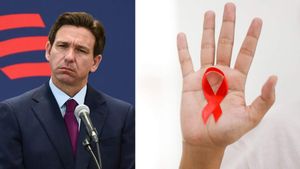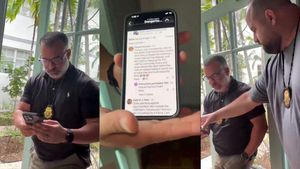Three former managers as AIDS Healthcare Foundation filed whistleblower claims in Florida last week alleging the foundation broke anti-kickback laws when it instituted its Linkage to Care Program, a system that gave commissions, bonuses and monetary rewards to employees for linking patients to AHF service centers. (Read our inital report on the case here.) One of the plaintiffs in the case, Jack Carrel — a man with 30 years in the HIV field — spoke with us regarding the case and his allegations. (AHF declined to comment for this story.)
How did this come about? When did you realize this was a problem?
When I first came to AHF I came with a lot of public health experience so I felt like I was being brought in to bring that public health division in the southern bureau in line with accepted public health practices. So I would look at each program and try to institute some procedures that would document what we were doing and have the backup that is generally looked for when funders are doing site visits and that sort of thing.
When I got to the Linkage portion, I knew the process we did and I started being involved in some of the meetings that we had with our funders, whether it be the county or the city, and I knew our process was, when someone was referred to us, one of our Linkage people they would link them to an AHF clinic. They didn’t offer them other places to go. And for every person they linked they got $100.
When I started going to these meetings, I realized that we were not (1) following what we had agreed to do and (2) the people above me were basically lying to our funders. They said that when someone was referred to us we would give them an option of going to any of the clinics they wanted to and then most of the time they chose AHF but we always offered them options which is part of the law. So I’m kind of like, this is kind of weird and I’m like, hey guys we need to have a sheet that at least we give people so they can see other places they have to go to, and it just never happened.
Then soon after that, I started getting reports about our return on investment and my part was public health and so a big part of that was HIV testing. I thought my goal was to identify new positives or previous positives who had fallen out of care, but in fact, from my return on investment sheet, my success – or my department’s success – was based on how many people we found who were positive that we linked to AHF pharmacies. There was a dollar amount based on that. And that’s how we were judged whether our program was successful or not.
So those are kind of like the two things that really started me like, hmmm, this is a little weird. And I would bring that to my supervisors, my two supervisors, and they said, “Well it’s a business model” and “Don’t worry about that”….It must have been the straw that broke their back. We had a site visit from her sup [the supervisor’s supervisor] for our Park Street contract in Jacksonville and Shawn [Loftis], who’s one of the other relators, and I had identified a number of irregularities, nothing’s reported and being billed, and we had actually talked to our project officer about those things because that’s what I’m used to doing. And we both got…in trouble for doing that, and during that meeting, there were three or four people from the main office for that site visit which was pretty unusual. And several times we were told, when the project officer was out of the room, "You two need to shut up. We’ll do the talking here. We understand this better than you do." So, we did. And the morning after I arrived back from that site visit I and my assistant were called in and laid off.
How does AHF’s business model compare to other nonprofit business models you’ve seen?
Well I think that, the big difference is the goal is to link people to care. So, where I am currently, we have a clinic, but our linkage people – when they find somebody who’s positive – give them an option of where they need to, where they want to go whether it’s something close to their home or just people they feel comfortable with, so clients actually have a choice in where they receive their care. And just in my experience – I’ve worked in HIV for over 30 years, I’m HIV positive myself – I know that being comfortable where you get your care is vital to staying in care.
But my experience of working at AHF, they had a huge turnover in clients and probably for those very reasons: they were linked to places that were not close to their house, or in neighborhoods they just, they didn’t feel comfortable in, or the clientele at that clinic just wasn’t comfortable for them so they just drop out of care.
So I think that’s the big thing there, like for most places the goal is to get people in care that’s it the end. Well and to get them virally suppressed. But it was clear at AHF it was, get them into care at our clinic and to get them filling their medicines at an AHF pharmacy. And I had some personal experience where a friend of mine received care there. He didn’t even get a prescription; they just sent him out in the lobby to the AHF pharmacy to pick up his medicine. So he didn’t even get a choice of where to get it filled.
How common is it to use a commission system like this in nonprofits?
It’s not. I actually don’t know another agency that pays a commission for linking clients to care.
What was the response from your supervisor? Was it to push it under the rug, or were they angry?
I think the first was that I really didn’t understand what was going on and that they had figured out that this was okay. And, I think the next one was, “Yeah, yeah, yeah we’ll take care of this,” kind of (like you said) just push it under the rug, or it just never got taken care of. We never changed things even though I would bring it up multiple times like, hey we really need to have a sheet with all the clinics on it, and “yeah, yeah, yeah we’ll get that,” and then it just never happened.
Do you think that was out of malicious intent or do you think they just kept putting it off?
I think it was purposeful, because, I guess, as you can see from the press release that they issued that they don’t feel like there’s anything wrong with this practice. So I think it was kind of, just to keep me mollified. And so yeah I think it was purposeful avoidance.
So the thing that tipped you off was that they were not referring to other clinics or that there was no list available?
I think it was when we started meeting with our funders and I heard them describing our process very different then I knew it was. And that was, that we didn’t give people free choice of where they received their services.
Were the funders you spoke to from Medicare or Medicaid? Or were they grantees?
They were grantees, the Ryan White grantees, in Ft. Lauderdale and in Miami Dade.
And they felt like there something wrong?
Well I guess they didn’t know, well actually let me backtrack on that. You know, I think they had a feeling that there was, because they would always bring that issue up at our meetings. They didn’t say, “We think you’re doing this wrong,” but they would say, “We just need to be clear that you need to be doing this.” And then the head of Linkage would always be like, “Oh yeah, yeah that’s how we do it.” So yeah, I think they [funders] had a feeling but it was hard for them to track it down.
Did any of them raise any concerns or did anyone back out of funding AHF for that reason?
They didn’t really back out of funding that I know of, but what they did do is try to institute another layer so that people were connected. They [the patients] were supposed to go to a neutral person or agency that then would offer them where to go and then if they chose AHF then they would get referred to us. But, what happened is we would, or AHF would, go around that and tell the funder that, people just wanted to get into care and they couldn’t wait to go through that process, which was not the case.
So I think they [the funders] tried to put some mechanisms in place to make it fair but they didn’t work. And just to be honest with you, AHF would sometimes say, “You know what, we see about 4,000 people here a year, do you want us to stop? Well if you want us to. If you don’t like how we do things, we’ll stop.”
They are a large provider of care to people with HIV. I can see that, as a funder, you’d want to see they don’t lose patients.
Yeah except, I’ve worked in HIV for almost 33 years now, and my experience has been that other providers wouldn’t let that happen. And I’ve seen places where agencies have closed for a variety of reasons and other providers have always, always, always stepped up to the plate and had the patients’ care first, and made sure people got the care they needed. So I don’t really feel like, that was a valid concern. I can understand where that concern comes from, but I don’t think that’s what would have happened.
Couldn’t recommending AHF centers be way to streamline the process? Isn’t the most important thing getting them into care?
So getting them into care is important, but keeping them in care is, I would say, equally or more important. And I think, taking away people’s freedom of choice of where they want to receive care is impacting that piece of it. So I think, it might look like it’s streamlining it, it might be getting them into their first appointment, but my experience is they didn’t retain people in care and so I would say, no.
Two of the big funders referred to in the court documents were Medicare and Medicaid. What kind of oversight did they have over AHF?
That’s something I’m not really that familiar with. I think that, because most of our people were funded by Ryan White that’s more my experience. So…I’m not sure on a national level how they interacted with Medicaid and Medicare though that’s where a lot of the funding came from.
Is it easy to hide these commissions and these bonuses or is it open in AHF’s self-reporting to funders?
Yeah it is and I think that’s maybe one of the things, the other red flags for me, when I started getting settled in my position, is the reports to our funders actually were submitted from the national office which seemed odd to me because we were the folks doing the work so how would they know what we do? So, information would be pulled from the electronic medical records so there were no paper records so when people came to do audits I think it was a little difficult for them to do that. And as far as the commissions, they really didn’t appear anywhere so – except on people’s paychecks. So, so it wasn’t, I can’t imagine a way, unless an agency did a really deep, deep audit, that that would come to light.
Don’t they have to be transparent? Wouldn’t it raise a red flag that personnel cost so much?
They do have to put their 990 – well they don’t have to but they’re encouraged to and I think AHF generally does – but that doesn’t go into much detail. They could just say, and they do say, we pay our people well because we want to keep them working for us.
Have you or any other relators had any sort of personal consequences either from AHF or trying to find jobs later?
Yes. When I came here to Baton Rouge, which I’d been here in Louisiana, I was there was when AHF first came here they asked to meet with all the providers and it was through a city meeting. And because this is my area, my supervisor asked me to represent our agency and the message that came back from the city was that AHF would not allow us at the meeting if I was the representative.
Was that because of the case?
That actually was before the case. In relation to the case, I’m part of the Louisiana AIDS Network here in Louisiana and AHF had agreed to work with us to rent some buses to bring people with HIV from around the state to the capital. And I was just informed, actually about 30 minutes ago, the national [representative] had told the local rep that they would not be doing that and that AHF could not participate in any activities that I was associated with or anyone who worked for we was associated with.
We got the impression that AHF’s practices were an open secret. What is the feedback from other foundations and other nonprofits?
I think, the feedback that I’ve gotten is that people don’t have great feelings about AHF. I think people had some gut feeling something was not quite right, but not exactly what it was.
What are the consequences for AHF if they lose?
My hope behind all of this is the process gets kind of rectified and that they start following the rules and they offer their clients free choice of where they want to go. And that they focus on – as opposed to how many people get linked to their pharmacies – they focus on how many people get retained in care and achieve viral suppression. That’s what I hope.







































































